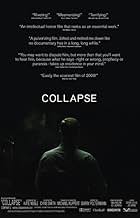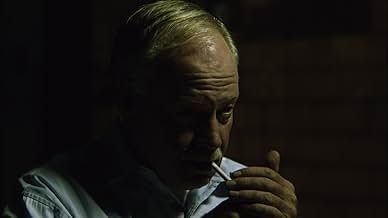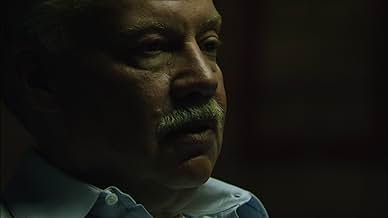Agrega una trama en tu idiomaA documentary on Michael Ruppert, a police officer turned independent reporter who predicted the current financial crisis in his self-published newsletter, From the Wilderness.A documentary on Michael Ruppert, a police officer turned independent reporter who predicted the current financial crisis in his self-published newsletter, From the Wilderness.A documentary on Michael Ruppert, a police officer turned independent reporter who predicted the current financial crisis in his self-published newsletter, From the Wilderness.
- Dirección
- Guionista
- Elenco
- Dirección
- Guionista
- Todo el elenco y el equipo
- Producción, taquilla y más en IMDbPro
Opiniones destacadas
I would like to have had more info on a lot of his quotes but I guess that would likely take an 80 minute documentary into like 3 or 4 hours (which I wouldn't have minded). I might just buy some if his books to take a look to see how much more in depth he gets on most of the topics he covers in this documentary.
For me, watching this, it was like it's about time. What I mean by that is finally someone who doesn't come across as a street corner preacher or a bona fide nut. This guy is just talking about real issues that matter, or at least they should matter.
Essentially what this film does is the equivalent of getting stuck at a bus stop listening to a guy who is convinced that the world is going to come to an end and that "they" are just keeping us in the dark for some reason. I don't mean this as negatively as it sounds but it is fair to say that this film doesn't hide the fact that at times Ruppert gets carried away with himself, doesn't always cope well with having the totally open stage that he has in the interview, gets passionate, is obsessive and does happen to make statements that (out of context) come off as paranoid and doomsday in nature. It is also fair to say that, unless you already share his mindset, that there will be several times during the film where he goes further than you will be willing to go or says things that either don't make sense, seem like a stretch or that you just plain disagree with.
Mostly the film lets him talk so it is only fair that these moments are left in the film because it does let us see that, being frank, Ruppert is obsessive and that perhaps some of what he says is exaggerated and extreme but this is not to say that he is 100% wrong. So while I personally don't agree with him on the imminent nature of the collapse of the oil reserves (or that they are significantly smaller than "they" are telling us), one cannot really argue that from plastics to fuel, we really have put all our eggs into the "oil" basket and that supplies are simply not infinite. Likewise, because all of our eggs are in one place, moving them may well be possible in small numbers but if we suddenly have no basket – we're going to have a load of broken eggs. At this level the film is engaging and provides plenty to think about and I think that Ruppert is at his best when he is talking generally because his basic points are hard to argue; it is only when he gets into specifics or gets tied up in details that he begins to say "they" too often or get a bit more emotional.
These moments hurt the film by hurting him, although in fairness since the documentary is technically about him, then it is all part of the film and is a good bit of balance. So yes, Collapse will lose you at some point but it will also engage you at many more; it isn't the most factual of documentaries nor is it the best in terms of structure but I found it mostly very engaging and it sent me onto news sites and opinion sites on the internet to read up on some of the less "opinion" related "facts" that it Ruppert presents. Worth seeing for its faults because it is engaging and provides much to think about, even if your conclusions may not lie as far out there as Ruppert's.
1. Ruppert discounts human ingenuity.
Having the benefit of the internet and the ability to research, you will find that even generous estimates tell us that any new power grid would take 30 years to establish. This means that if aliens came down to earth and gave us a perfect technology that required no input and had zero emissions it would still require a lot of oil and time to build an infrastructure to support it. The fact is oil has artificially increased our carrying capacity and when its gone, the excess population will go with it. The standard of living we all have come to demand will likely never return and certainly not for 7+ billion people. (not that we all have Hummers and flat screens now)
2. The San Francisco (chronicle?) lauds the moment Ruppert cries because they think he is lamenting the fate of humanity.
I think it's highly likely, and more compelling to look at the beginning of the documentary where he says he's lost his fiancé to betrayal and only has his dog, the beach, and this movement to get him by. He's crying because he thinks it will take a community to survive in the aftermath of the collapse, and he has no loved ones.
It seems I need to continue my comment based on IMDb policy of ten lines. That doesn't impress me as necessary, but I see the decision isn't mine. It's a great film, go and watch it. Anyway, hopefully this is enough to satisfy the rules. Why the needless wordiness IMDb? I liked the film and the participant, that isn't enough said? I'll bet many reviews never get posted based on the ambiguous ten lines rule.
All of his concerns are true, and some are even worse than he stated, but the very worst problem of all didn't even get a mention from him....that of global overpopulation that is the root cause of all the symptoms of our existence troubles that he did state.
To simplify......if the world's population was 20% of what it is now, the maximum sustainable figure, all of Ruppert's concerns for human existence would not be crucial for thousands more years when real solutions to the problems he stated might be available. But, we cry about the symptoms and don't care one bit about the cause so we continue to overpopulate all countries with uncontrolled new births, and are continually overburdened with resultant and mostly unsolvable problems as a result. Air, water, oil, food, and every single other problem of today that Ruppert stated has been caused by overpopulation, but still we cry only about symptoms, as Ruppert does, instead of the root cause of all our global problems....too many people being born with no controls on it and, what is much worse, no gov't or societal thought even being given to it.
As a result of that typical human stupidity and shortsightedness we are done, people, it is just a matter of time, and not that much time either, as your own young grandchildren will suffer badly as a result. But, still you don't care, so nothing is ever done about it. We don't deserve any more time on earth if we don't even care enough about protecting our continued existence by working on the cause of all of our problems.
¿Sabías que…?
- TriviaAccording to director, Chris Smith, they initially agreed the primary subject was supposed to be the CIA's connections to drug smuggling within the Iran-Contra affair, specifically Ruppert's collaboration with Pulitzer Prize-winning reporter Gary Webb's mid-1990's investigative series, "Dark Alliance." But Ruppert didn't want to talk about the CIA. Instead, he wanted to talk about peak oil, and its critical implications for the future.
- Citas
Michael Ruppert: It's kind of sad because we as a species have become so disconnected from the Earth. We don't have any real contact with the Earth. We don't have any sense of its functions, its feeling, its seasons, its timings.
- ConexionesReferenced in Film Junk Podcast: Episode 235: TIFF Report, Part 1 (2009)
- Bandas sonorasCollapse
Performed by Karli Larsen, Didier Leplae, Joe Wong
Selecciones populares
- How long is Collapse?Con tecnología de Alexa
Detalles
Taquilla
- Total en EE. UU. y Canadá
- USD 46,964
- Fin de semana de estreno en EE. UU. y Canadá
- USD 7,800
- 8 nov 2009
- Total a nivel mundial
- USD 46,964
- Tiempo de ejecución1 hora 22 minutos
- Color
Contribuir a esta página



















